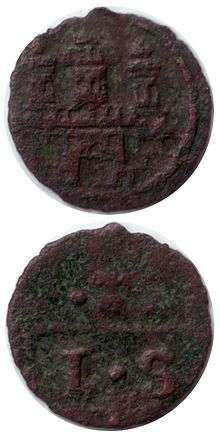Scherflein
German

A Scherf coin from 16th century Hamburg
Etymology
Diminutive of Scherf, from Middle High German scherf, scherpf (“a coin of small value, esp. a halfpenny”), from Old High German scerf.[1] Related to modern Scherbe (“shard”) and Middle High German scharben (“to notch, to nick”) (from Old High German scarbōn, cognate with Old English sceorfan (“to gnaw, to bite”)), because the coins were originally notched so they could be broken up for payment when needed.
Introduced by Luther as a translation for the Ancient Greek λεπτόν (leptón, “small coin”) in Mark 12:42.
Pronunciation
- IPA(key): /ˈʃɛɐ̯flaɪ̯n/
Audio (file)
Noun
Scherflein n (genitive Scherfleins, plural Scherflein)
- widow's mite, i.e. a small donation or contribution, esp. of monetary kind.
- 1798, Johann Wolfgang von Goethe, Hermann und Dorothea:
- schon von dem ersten bericht so groszer leiden gerühret,/ schickten wir eilend ein scherflein von unserm überflusz, dasz nur/ einige würden gestärkt, und schienen uns selber beruhigt.
- (please add an English translation of this quote)
-
Usage notes
- In contemporary usage, mostly used in the idiomatic expression sein/ihr Scherflein (zu etwas) beitragen ("to contribute one's mite (to something)").
Declension
Further reading
- Scherflein in Duden online
References
- Cf. 'Scherf' in Grimm's Dictionary. http://woerterbuchnetz.de/cgi-bin/WBNetz/wbgui_py?sigle=DWB&mode=Vernetzung&lemid=GS07009#XGS07009
This article is issued from
Wiktionary.
The text is licensed under Creative
Commons - Attribution - Sharealike.
Additional terms may apply for the media files.